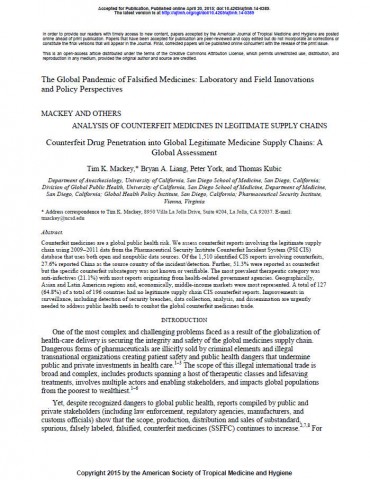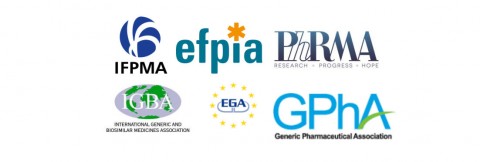IFPMA Statement under WHA 65 agenda item 13.13 on Substandard / spurious / falsely-labelled / falsified / counterfeit medical products
Delivered by Mr Mario Ottiglio, Associate Director, Public Affairs and Global Health Policy
Thank you on behalf of the International Federation of Pharmaceutical Manufacturers and Associations (IFPMA), for the opportunity to provide our perspective on this public health issue related to fake medical products. IFPMA represents the global R&D pharmaceutical industry, whose primary contribution to global health is the development of innovative medicines and vaccines.
IFPMA supports the work of the Working Group of Member States on Substandards/Spurious/Falsely-Labelled/Falsified/Counterfeit Medical Products. We believe that now it is the moment to make efforts to agree on a global agenda which puts patients’ safety at the core by adopting the proposed new mechanism.
Fake medicines at best cheat people, at worst kill. Taking them can turn a treatable disease into a fatal one and can also foster drug resistance. It’s a crime against patients and it is only right that we should expect the global health community to tackle it with the same vigor as any other health threat.
According to reporting to the Pharmaceutical Security Institute, incidents of counterfeiting were documented in every therapeutic category and every region of the world, and today 124 countries have experienced this phenomenon.
Counterfeiters do not discriminate. Fake versions of both generic and branded medicines have entered the supply chain in developed, as well as developing countries. And the internet has facilitated trade in counterfeit medicines, contributing to boost this criminal activity
According to WHO, purchase of medicines via the Internet has a high chance of exposing patients/consumers to spurious, falsely labeled, falsified, or counterfeit medicines and in over 50% of cases, medicines purchased over the Internet from illegal sites that conceal their physical address have been found to be counterfeit.
We see that more actions are being taken by competent authorities in different parts of the world and that awareness raising in the media is increasing. We support and encourage governments and other stakeholders to develop robust education and awareness programs to inform the public about the potential dangers of fake medicines and to raise awareness about how patients can purchase medicines safely from lawful sources.
The experience in fighting the trade and the existence of this serious crime threatening global public health shows that this is an issue which requires multi-stakeholder and multi-disciplinary collaboration both at the local and the global levels. As a partner in global health, we stand ready to play our part in sharing our expertise
Patients worldwide are looking at today’s forum, at WHO, as the one place where safety, efficacy, and high quality of medicines are protected.
The time has come for decisive and concerted actions to be taken against this crime to public health.












